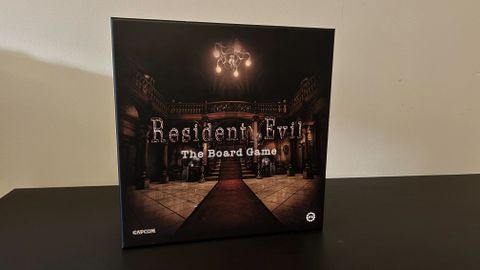This isn’t the first time Steamforged Games has entered the murky world of Resident Evil. The brand has spent significant time faithfully translating the Capcom survival horror series to tabletop, alongside countless other video game adaptations from Horizon Zero Dawn to Sea of Thieves. Having previously subjected my friends to the horrors of Resident Evil 3: The Board Game, it was time to take things back to the beginning.
It should be noted that Steamforged isn’t tackling these games in order, and the latest game being the original Resident Evil title could confuse at first. However, setting up the shadowy corridors of Spencer Mansion for the first time will schmooze long-time fans thanks to the original’s claustrophobic charm and timeless terror. I spent a month with the latest release to see just where Resident Evil: The Board Game sits among the best board games on the market.
Features & design
| Price | $99.99 / £99.99 |
| Ages | 14+ |
| Players | 1 - 4 |
| Game type | Cooperative |
| Genre | Horror |
| Complexity | Moderate |
| Lasts | 90 - 120mins |
| Play if you like | Betrayal at House on the Hill, Mansions of Madness, horror films, Resident Evil |
- Very faithful to the source material
- Offers a sense of dread at what lurks behind every door
- Puzzles and side-quests add variety
S.T.A.R.S is heading out of Racoon City, to a mountain range said to be the home to a series of strange happenings - of course, our squad has been attacked and sought the refuge of a mysterious mansion. From here, Resident Evil: The Board Game sprawls as a 1 to 4-player dungeon crawler, taking players through the dusty halls of the GameCube title's Spencer Mansion. A main campaign mode remains remarkably faithful to the source material, running through a series of missions and bringing familiar faces to the fore. If you don't have the time to sink into this 20 hour endeavor, though, you can also play Resident Evil: The Board Game via a series of vignettes.
Much like the original game, each mission has players exploring a different area of the Spencer Mansion. Rather than viewing the entire floorplan straight away, as has traditionally been the case in Resident Evil board games, though, Steamforged has made a masterful decision. Campaigns can start this way, but others require players to only add new rooms as and when their doors are opened. This was one of my favorite additions to the experience when I previewed the game last year, and with the weight of a full campaign behind it, the threat of uncovering something particularly ugly rings even louder in the full release. You're now desperately seeking out typewriters, weighing up the risk of opening just one more door (it could hold the final piece to your puzzle, or a set of zombie dogs ready to make your life a lot... a lot harder).

As before, Resident Evil: The Board Game's player turns take the form of three phases. At the start of each turn, a player can move, attack a nearby terror, open and close doors (this is far more important than I first thought), and grab helpful or mission critical items. This is Resident Evil, though, so everything you do is being watched. The second phase belongs to the undead. A movement too close to a zombie (or zombie dog), or an attack, will trigger nearby enemies to become aware of you. This is when they start stumbling over to your location and, if you've left yourself vulnerable, can attack. That's where those pesky doors come in. Fly through the mansion without closing all those doors behind you and you'll soon find yourself with a horde of zoms slowly catching up to you. Close the doors and that line of sight is broken.

The final phase will be familiar to those who have played previous Resident Evil entries: enter the Tension deck. Players draw random cards designed to throw a spanner into the (already very busy) works. Sometimes you get lucky and nothing changes, other times these cards can cause complete carnage.
Resident Evil: The Board Game also brings a range of new mechanics to the experience. Smaller story 'side quests' pop up, bringing other Resi faces into the fold for future missions, new puzzles can require some serious map planning and resource strategy, and the need to douse zombies in kerosene to fully down them after defeat all work to keep the experience feeling fresh.
Gameplay

- Palpable tension throughout
- Zombies are incredibly hard to kill
- Big difficulty spike from previous Resi games
I was lucky. I'd played through Resident Evil 3 and previewed this very board game last year. My friends didn't have that luxury, but the tutorial managed to get them up to speed fairly quickly - barring a few missed steps over a couple of turns further into the campaign, and some initial confusion around a zombie's state of awareness. This system gets you into the style of the game with a simple combat encounter and small exploration example. Diving straight into our first scenario, we were paralysed with indecision.
So powerful is the effect of an undiscovered map (and the threat of a horde of zombies), we were nervously eyeing our already limited ammunition supplies and silently studying our character cards in preparation for the worst. Once the first player took their initial bold step, though, we were off. This fear of the unknown is at its most horrendous in the first few minutes of any survival horror game. Unfortunately, once the enemy is spotted - and swiftly dealt with - the sting of that fear is often dulled. The thing with Resident Evil: The Board Game, though, is it's so damn difficult to actually kill these things.

I've only got one bullet left, and dice rolls haven't been going my way for the last few turns. A poorly timed tension card just reanimated the zombies around me, and even if I do manage to land a bullet, I don't have any kerosene to keep the thing dead once I've made my escape. This is the worst case scenario I was preparing for, but even as I dash out the door (an imminent threat reduced to slow pounding dread behind me), I'm still ready for a fight. There's a significant difficulty spike compared to Steamforged's previous Resi games. Even this first encounter had my party sweating, and we seemed to just scrape through nearly every time.
Resource management, combat, and enemy awareness mechanics all work together to create an incredibly powerful sense of despair. This is a tactical game, but one with a healthy fight or flight response still lingering in its DNA. That's why the additional atmosphere is so well placed. Nothing can remind you of your own isolation more than word from the outside world. However, Resident Evil: The Board Game's story cards (with a small minigame attachment to determine whether the character in question survives their encounter and joins your party), not only create a sense of the game's wider world, but also serve to prove just how alone your crew really is between the walls of the mansion.

Unfortunately, such a sense of immersion doesn't translate too well to the art of the mansion itself. There's a lot of repetition in these map pieces, which is understandable - they're designed to speed up setup by simply relying on shape rather than requiring particular pieces for each encounter. However, repeating a dining room scene and seeing the same hallway over and over again in the same encounter quickly grows old.
Delights in its incredible ability to keep its players' teeth gritted
Similarly, game pieces take on a dark, murky aesthetic (and rightly so, nobody's asking for neon pink here). However, such an art style has been taken just a little too far on doors, to the point where we were constantly having to backtrack after mis-reading a closed or open door due to the darkness of the picture.
Should you buy Resident Evil: The Board Game?

Resident Evil: The Board Game delights in its incredible ability to keep its players teeth gritted. This is a desperate fight (sometimes more of a terrified thrash) for survival - as any good horror title should be. I can't recommend the base game (and additional expansions if you fly through it quick) enough for fans of the original game or any titles in the series. However, Resident Evil: The Board Game is also a snappy, atmospheric experience for anyone coming from a tabletop background rather than a video game one. It's an excellent game in its own right with a tight resource management system and fantastic risk / reward gameplay style. Whether you're after a co-op board game for horror fans or simply a board game for adults who won't mind a bit of adrenalin, this is a top pick.
Buy it if...
Don't buy it if...
How we tested Resident Evil: The Board Game
I played Resident Evil: The Board Game in batches over the course of two months, starting with a few solo missions and then venturing into the main campaign with three friends across three sessions. I also compared art, guidebook, and card materials to Resident Evil 3: The Board Game. For more information on how we test board games, check out the full GamesRadar+ Hardware Policy.
This is no board game for kids, but if we are also rounding up all the best board games for families if you're looking for something new this coming game night. Or, check out the best classic board games for a more traditional experience.


